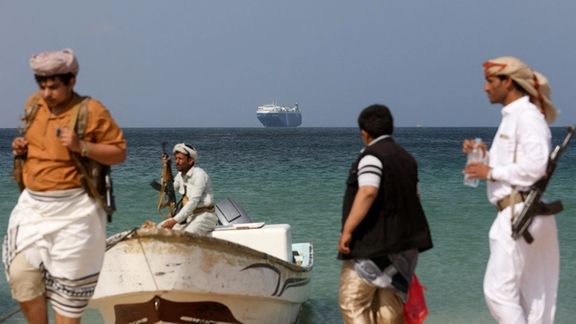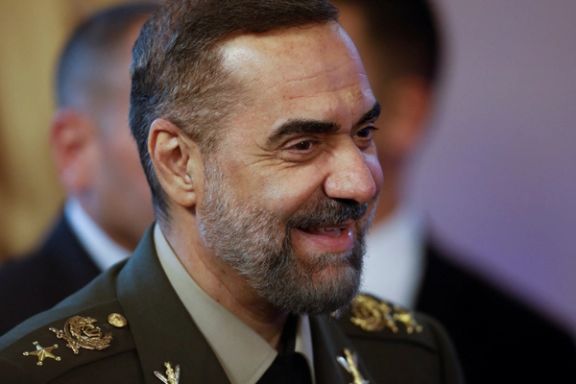Iran Defense Minister Slams US Naval Coalition Plan In Red Sea

Iran’s Defense Minister Mohammad-Reza Ashtiani rejected as “irrational” a US plan to launch a multinational naval coalition to guarantee maritime safety in the Red Sea.

Iran’s Defense Minister Mohammad-Reza Ashtiani rejected as “irrational” a US plan to launch a multinational naval coalition to guarantee maritime safety in the Red Sea.
The region has no room for any more power struggles, Ashtiani said, further stressing that in case Washington’s decision is executed, it will face “extraordinary problems.”
Amid attacks by Iran-backed Houthis on commercial shipping off the coast of Yemen, he referred to the Red Sea as “our region” and warned that “nobody can make a move in a region where we have predominance.”
While adopting a defiant and threatening tone, Iran’s defense minister did not specify the moves Tehran is ready to make if the idea of a multinational naval force is implemented.

His remarks came three days after US National Security Adviser Jake Sullivan announced that Washington is considering to beef up measures to protect shipping in the Red Sea where Iran-backed Yemeni Houthis have been targeting vessels over the past weeks.
“We are in talks with other countries about a maritime task force of sorts involving the ships from partner nations alongside the United States in ensuring safe passage,” he pointed out.
Sullivan called this plan Washington’s “natural response” to the ongoing situation in the Red Sea. Active negotiations are being held with US allies about escorting ships in the region but nothing has been finalized yet, he went on to say.
According to reports, 12 countries may join the US-led naval coalition.
On Wednesday, Mohammed Al Bukhaiti, a Houthi official, said his group possesses “formidable leverage” against countries that participate in a naval coalition in the Red Sea.
Though the Islamic Republic has avoided any direct military involvement in the Israel-Hamas conflict, the regime has used its allies such as Houthis and militant groups in Iraq and Syria to attack Israel and American targets in the region.
Houthis have intensified their attacks since the truce agreement between Israel and Hamas collapsed on November 1.
On Wednesday, Yemeni Houthis fired two missiles that missed a tanker carrying jet fuel and headed to the Suez Canal.
A US Navy warship also shot down a suspected Houthi drone flying in its direction during the same incident, a US official was quoted as saying by the Associated Press.
Houthis further attacked the Norwegian commercial tanker STRINDA with a rocket on Tuesday.
Back in November, Iran’s proxy group also seized a cargo ship called “Galaxy Leader” in the southern Red Sea as it was sailing from Turkey to India.
Houthi military spokesperson Yehia Sareea vowed that the group would continue blocking ships heading to Israeli ports until Israel allows the entry of food and medical aid into the Gaza Strip - more than 1,000 miles from the Houthi seat of power in Sanaa.
US National Security spokesman John Kirby took Iran to task last week for destabilizing the region by providing financial and military assistance to extremist militant groups, such as Yemeni Houthis.
“We know that the Houthis are supported by Iran, not just politically and philosophically but, of course, with weapon systems,” he stressed.
On December 7, the US Department of Treasury slapped sanctions against 13 individuals and entities over their role in financing Iran-backed Houthis in Yemen.
Supported by the IRGC extraterritorial Quds force, the financing system operated through “a complex network of exchange houses and companies in multiple jurisdictions,” the Department of Treasury announced in a statement.
Despite the recent sanctions, the Biden administration is receiving more and more criticism over its failure to deter Iran and its proxies in the Middle East.
Earlier in the week, Israeli National Security Council head Tzachi Hanegbi said that Prime Minister Benjamin Netanyahu has talked with the leaders of US, Britain, Germany, and France to discuss the increasing threats posed by Yemeni Houthis against Israel-bound ships.
“Israel is giving the world time to organize and prevent it … If there is no international organization - because this is a global problem - we’ll work to remove the maritime closure,” he said in reference to Houthi’s offensives.
The Wall Street Journal reported last week that Washington has urged Israel not to respond directly to drone and missile attacks by Tehran-backed Yemeni Houthis.